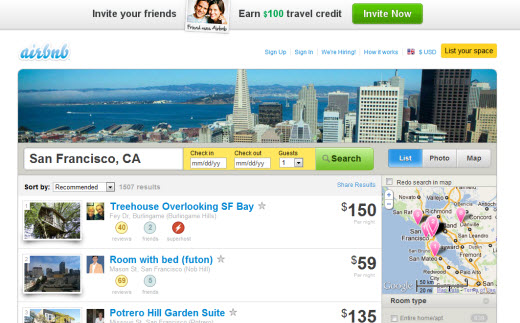Second AirBnB Trashed Apartment Horror Story Emerges: 3 Ways To Address Growing Concerns
AirBnB has been dealing with quite a bit of negative publicity as the story of a California woman, whose apartment was ransacked, robbed and trashed, circulated on popular blogs and mainstream media sites. While the investigation into that case continues, it seems the whole apartment ransacking facilitated by AirBnB thing isn’t a one off incident, as previously implied by the company.

The meth pipe found in the ransacked apartment of an AirBnB apartment owner. A suspect in a separate apartment ransacking incident was arrested for possession of meth.
TechCrunch is reporting that a man named Troy Dayton encountered similar problems when renting his apartment out via AirBnbB:
“In addition to valuables stolen, the thieves/addicts did thousands of dollars of bizarre damage to my rented home and left it littered with meth pipes. They were identity thieves, too and all my personal information was strewn about. Further investigation of my own led me to evidence that the people were not just thieves but were also dangerous. I too, feared for my own safety and would not stay at my house for some time.
I had a similar problem with haphazard communication from people at AirBnB. I gave them multiple opportunities to make me a happy customer to which they did but then retracted their offer after their was miscommunication among the team. Sometimes days went by without hearing from anyone, while I was fear-stricken, totally disoriented, and angry. It was almost the most absurd customer service crisis one could ever imagine. But I am one squeaky wheel, and we eventually found an agreeable solution that I was generally pleased with.” {TechCrunch}
While Dayton was satisfied with AirBnB’s response to the situation (after a bit of back and forth, they compensated him for bookings at other AirBnbB studios and one bedroom apartments for 3 weeks), this obviously takes the problem beyond an isolated incident to one that AirBnB will have no excuse to be unprepared for a third time (if this is, indeed, only the second time such apartment trashing has happened).
There are 3 things AirBnB has to do immediately to stop these type of incidents from permanently damaging the company.
1. Implement a 24-hour Customer Service Line
At the heart of its business model, AirBnB maintains that it’s only a marketplace for temporary and vacation rentals, but if they want to continue to charge a fee for that (as opposed to Couchsurfing, which facilitates alternative travel accommodations for free) both renters and apartment owners are going to expect more than they would from a Craigslist or Couchsurfing post gone wrong.
Both EJ, the woman who wrote the blog post that initially gained attention, and Dayton spoke about frantically trying to get in touch with someone from AirBnB, only to be left sitting in their destroyed apartments for hours at a time with no reply. After the initial response to EJ, communication was intermittent, seemingly concluding with the CEO contacting her to pressure her to update her blog post with a happier ending, though many issues remained unresolved.
With over $100 million in funding, there’s no reason AirBnB shouldn’t be able to implement some sort of 24-hour customer help line. Not only for serious cases like EJ’s and Dayton’s, but even relatively minor incidents like renters not being able to get in touch with apartment owners when problems arise.
While many travelers have smartphones that keep them in touch by email, if you’re in an unfamiliar city or location, being able to pick up the phone and reach someone – rather than waiting 14 hours for an email telling you that there’s nothing that can be done to help, could be a huge reassurance.
2. Plan for the Worst Case
So two cases out of hundreds, likely thousands, of bookings does not mean the AirBnB model doesn’t work. Troy Dayton has gone on to rent his apartment out on AirBnB again, without any other incidents like his first horror story. Even though the worst case doesn’t happen that often statistically, the fact that it’s happened twice without any measures put in place to protect against it happening in the future is a problem.
How do you plan for the worst case?
Insurance would be a good policy. No one plans on getting into a car accident, or having their home burn down, or getting sick. That’s why auto, home and health insurance exist, because in spite of our best plans, sometimes really bad things happen. Most home insurance policies wouldn’t cover subletting or damage from subletters. AirBnB could easily have a very lucrative secondary business model by creating just such an insurance policy.
That would not only pay more than lip service to the claim that these type of incidents are infrequent, and don’t happen often; but AirBnB would also have hard data to prevent future incidents.
Both apartment ransackings took place in the San Francisco Bay area, there’s evidence that drug addicts and identity thieves were involved in both (San Francisco police have a 19-year-old suspect in custody in EJ’s case, who was charged with possession of meth and stolen goods among other things). A pattern, perhaps?
If AirBnB truly took on the responsibility of paying for damages surrounding legitimate criminal incidents, they’d have an incentive well beyond good PR to ensure that the warning signs of one incident don’t lead to a second.
3. Open Up
Implement more open profiles for renters and apartment owners. Though all of the incidents we’ve heard about so far have involved the people who own apartments and rent them out, it’s only a matter of time before other stories of renters scammed or misled by apartment owners emerge. AirBnB understandably wants to keep transactions on their site, but at the minimum AirBnB needs to know more about who’s on their site if they expect users to continue to go with the “just trust us” responses. AirBnb should be able to – at a minimum – verify a user’s real name and physical address, even if they don’t pass this information on until after a booking is confirmed.
Unverified users could be allowed to use the site, but with additional fees, of restrictions on the number of nights or accommodation type that could be booked. A shared room might be allowed, but an entire apartment might not, for example.

